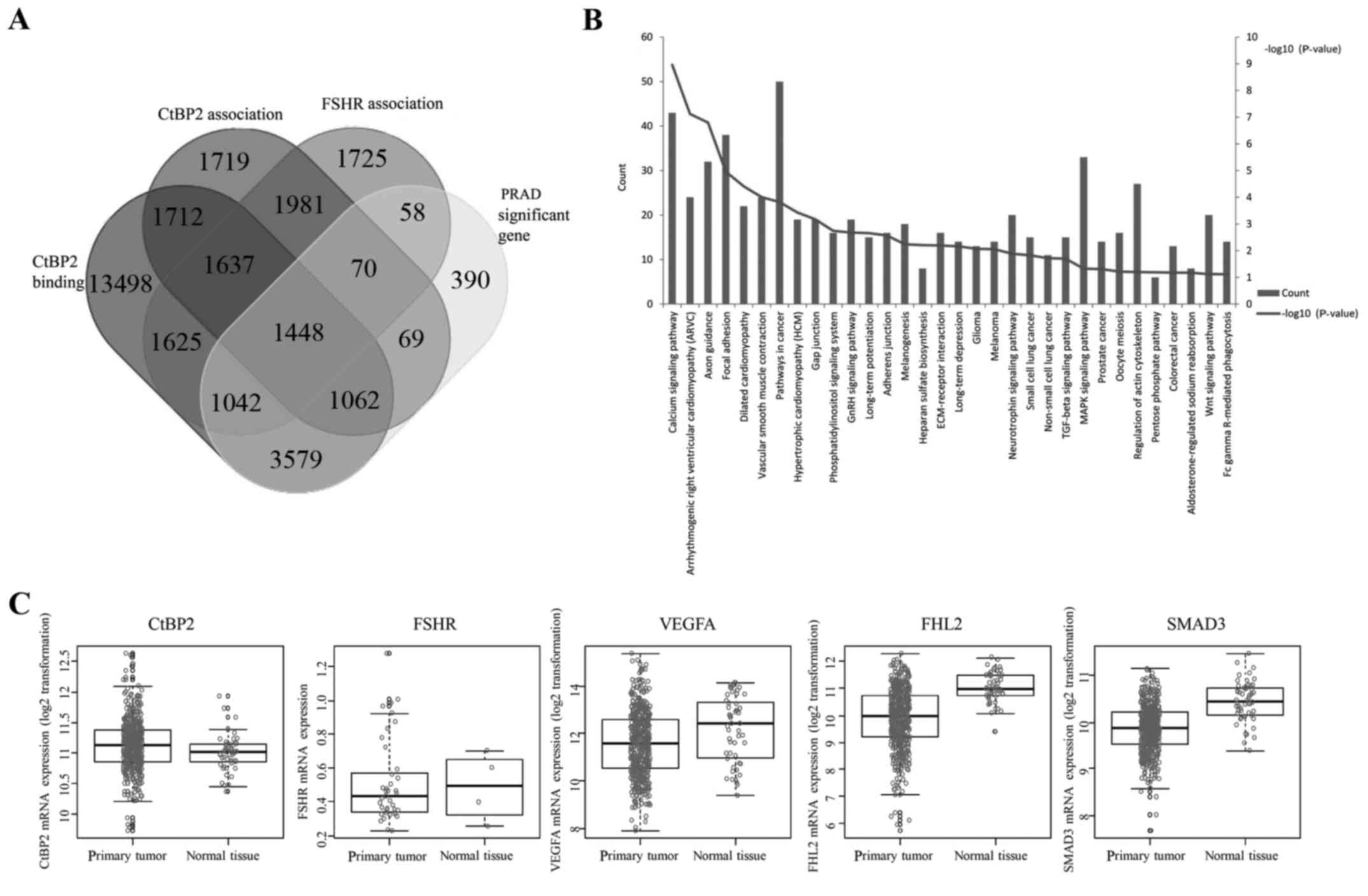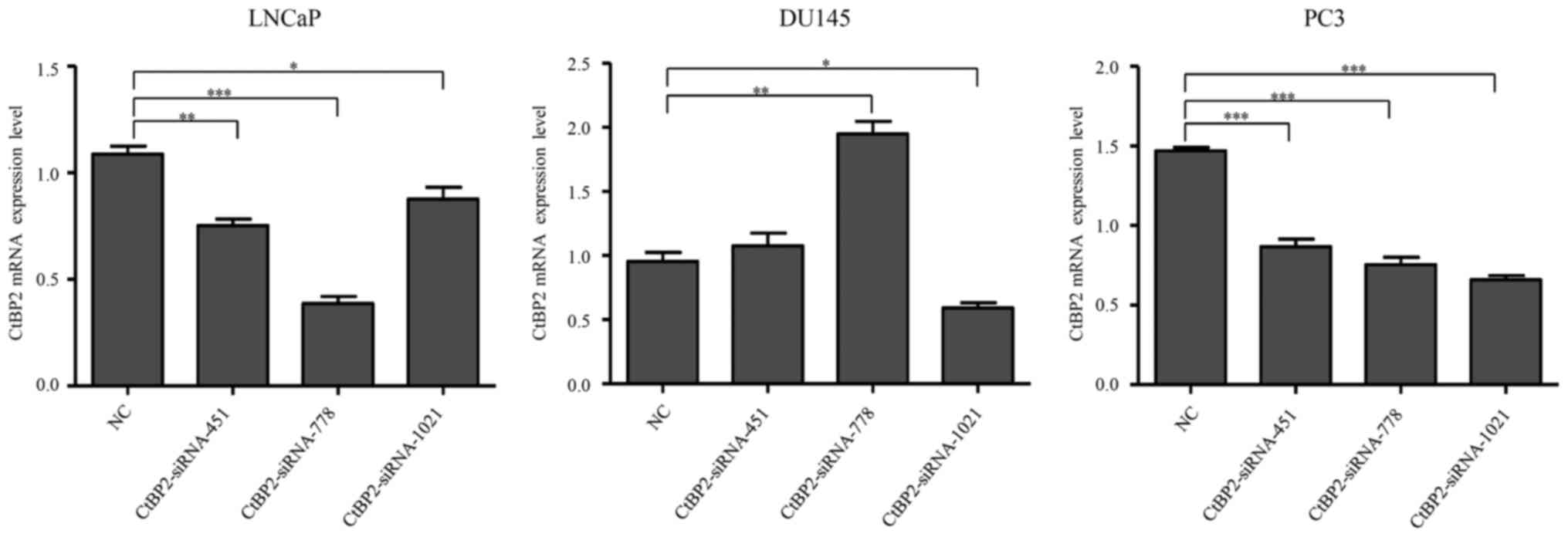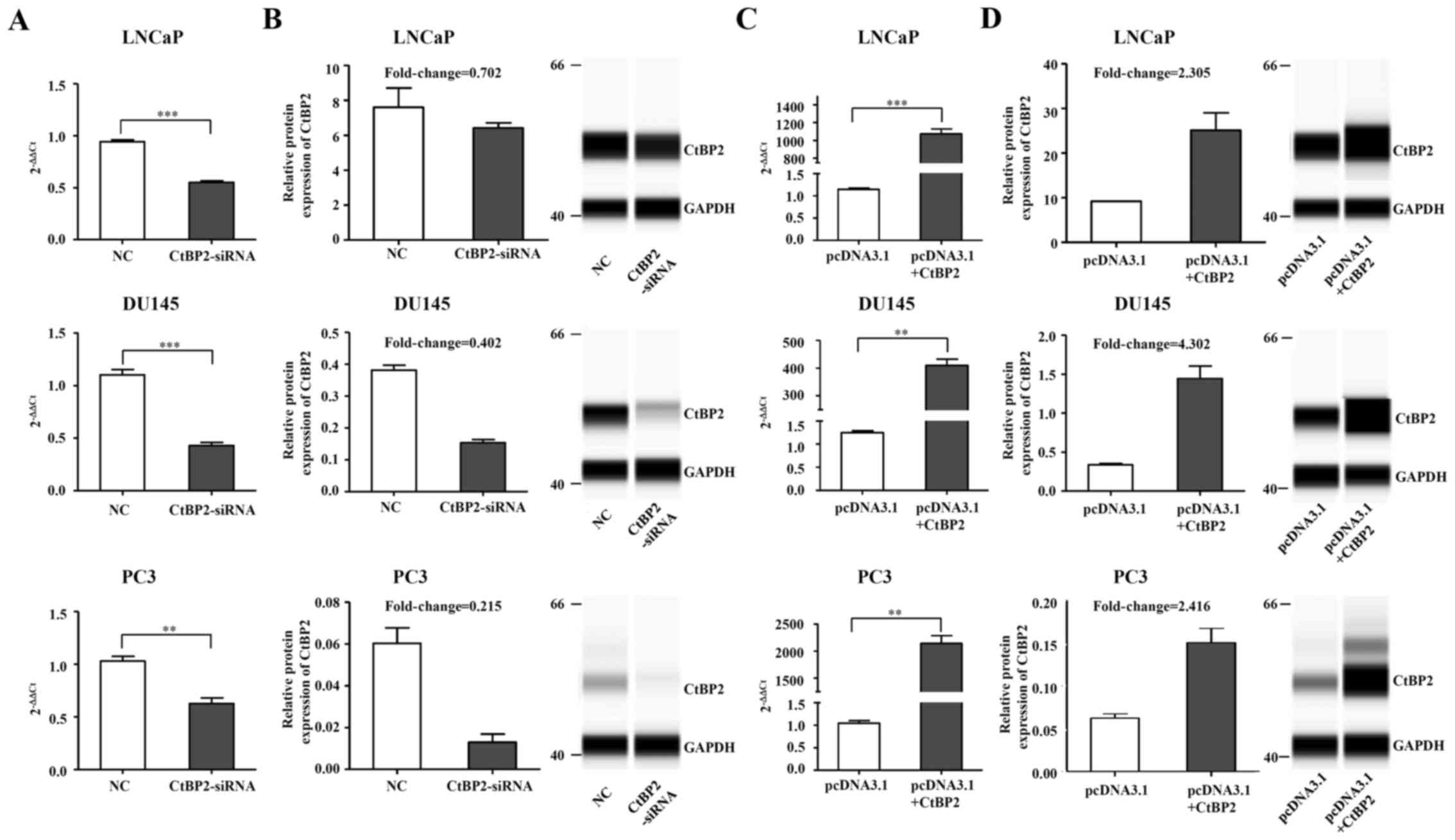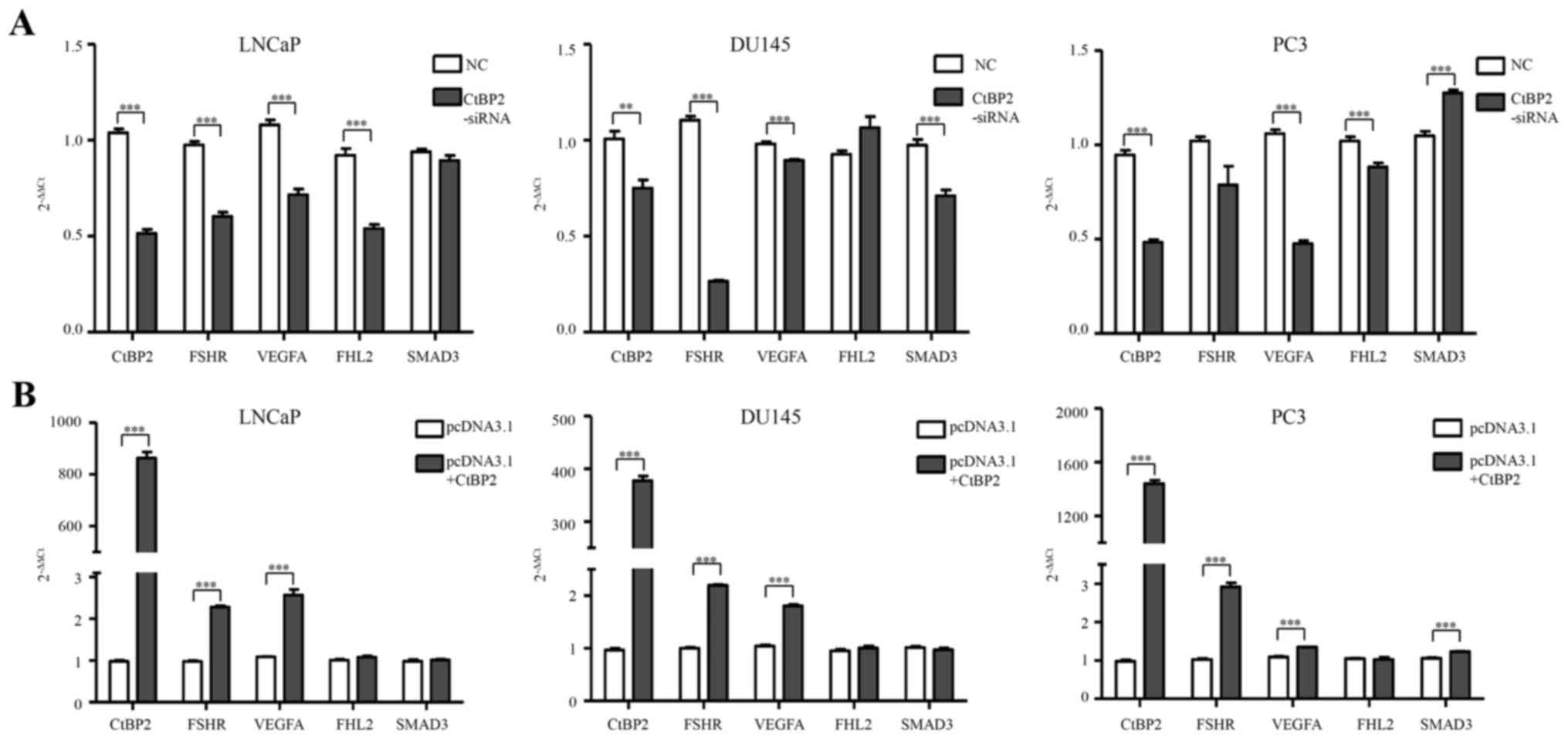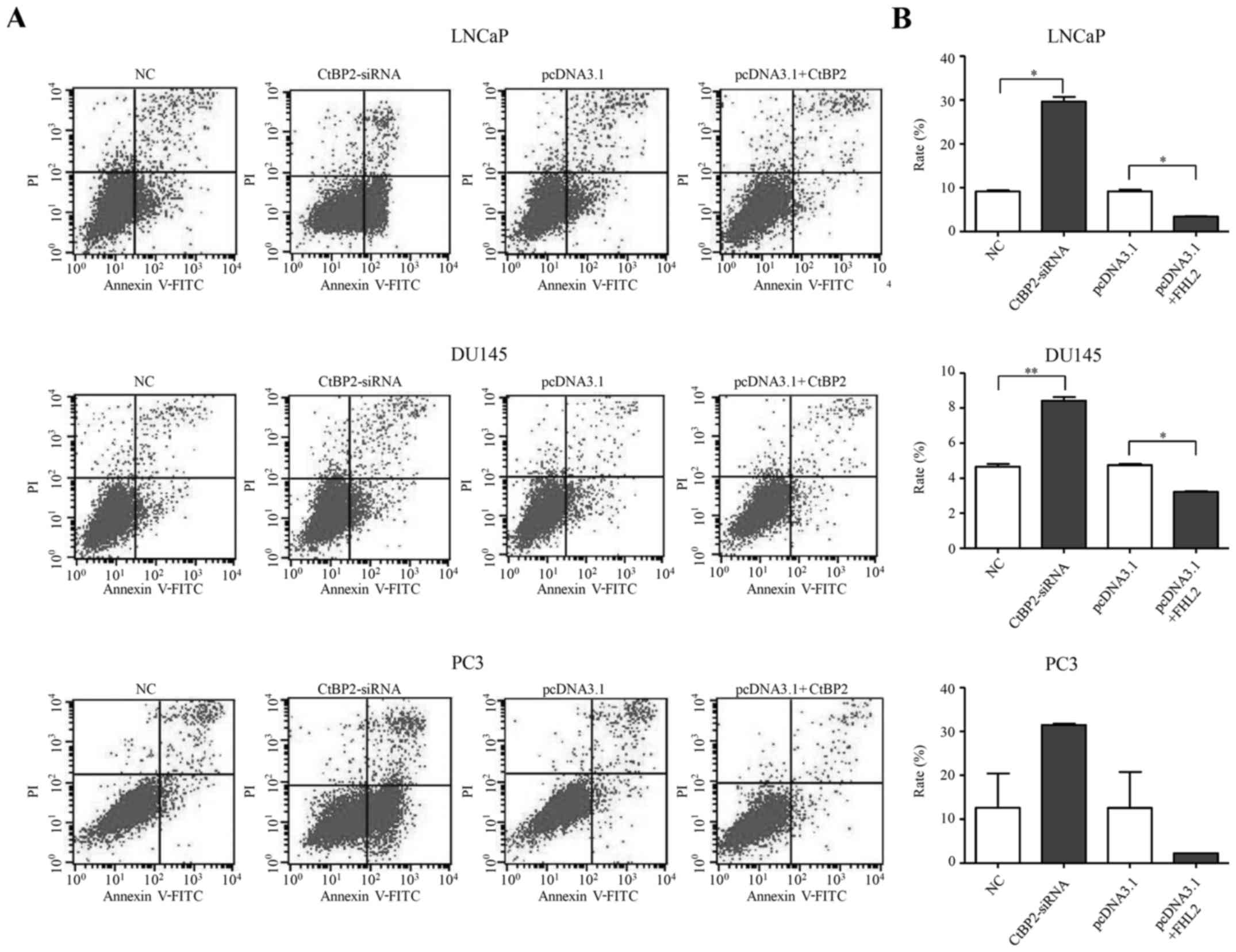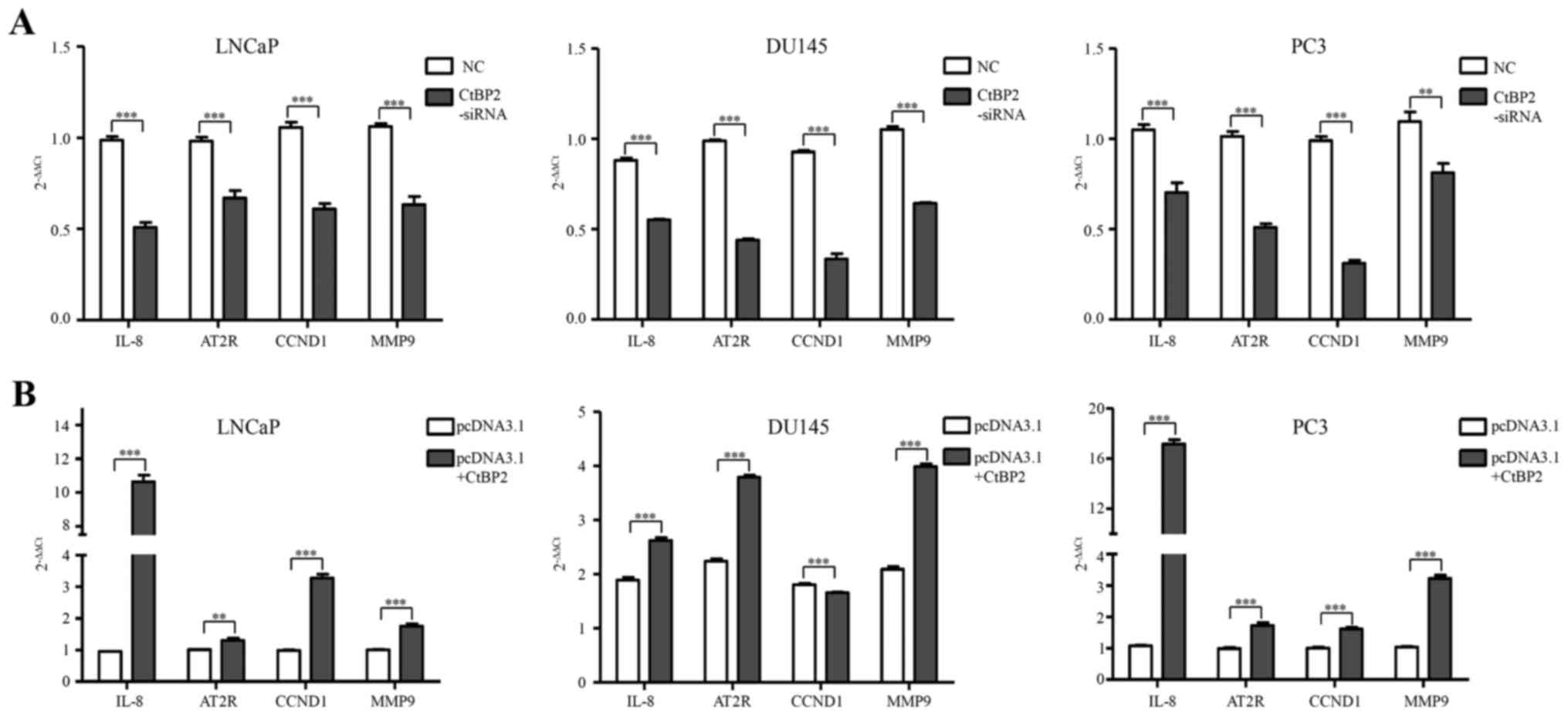|
1
|
Torre LA, Bray F, Siegel RL, Ferlay J,
Lortet-Tieulent J and Jemal A: Global cancer statistics, 2012. CA
Cancer J Clin. 65:87–108. 2015. View Article : Google Scholar : PubMed/NCBI
|
|
2
|
DiBlasio CJ, Malcolm JB, Hammett J, Wan
JY, Aleman MA, Patterson AL, Wake RW and Derweesh IH: Survival
outcomes in men receiving androgen-deprivation therapy as primary
or salvage treatment for localized or advanced prostate cancer:
20-year single-centre experience. BJU Int. 104:1208–1214. 2009.
View Article : Google Scholar : PubMed/NCBI
|
|
3
|
Ramsay AK, McCracken SR, Soofi M, Fleming
J, Yu AX, Ahmad I, Morland R, Machesky L, Nixon C, Edwards DR, et
al: ERK5 signalling in prostate cancer promotes an invasive
phenotype. Br J Cancer. 104:664–672. 2011. View Article : Google Scholar : PubMed/NCBI
|
|
4
|
Maruyama Y, Miyazaki T, Ikeda K, Okumura
T, Sato W, Horie-Inoue K, Okamoto K, Takeda S and Inoue S: Short
hairpin RNA library-based functional screening identified ribosomal
protein L31 that modulates prostate cancer cell growth via p53
pathway. PLoS One. 9:e1087432014. View Article : Google Scholar : PubMed/NCBI
|
|
5
|
Turner J and Crossley M: The CtBP family:
Enigmatic and enzymatic transcriptional co-repressors. BioEssays.
23:683–690. 2001. View Article : Google Scholar : PubMed/NCBI
|
|
6
|
Chinnadurai G: CtBP, an unconventional
transcriptional corepressor in development and oncogenesis. Mol
Cell. 9:213–224. 2002. View Article : Google Scholar : PubMed/NCBI
|
|
7
|
May T, Yang J, Shoni M, Liu S, He H, Gali
R, Ng SK, Crum C, Berkowitz RS and Ng SW: BRCA1 expression is
epigenetically repressed in sporadic ovarian cancer cells by
overexpression of C-terminal binding protein 2. Neoplasia.
15:600–608. 2013. View Article : Google Scholar : PubMed/NCBI
|
|
8
|
Deng H, Liu J, Deng Y, Han G, Shellman YG,
Robinson SE, Tentler JJ, Robinson WA, Norris DA, Wang XJ, et al:
CtBP1 is expressed in melanoma and represses the transcription of
p16INK4a and Brca1. J Invest Dermatol. 133:1294–1301.
2013. View Article : Google Scholar : PubMed/NCBI
|
|
9
|
Di LJ, Byun JS, Wong MM, Wakano C, Taylor
T, Bilke S, Baek S, Hunter K, Yang H, Lee M, et al: Genome-wide
profiles of CtBP link metabolism with genome stability and
epithelial reprogramming in breast cancer. Nat Commun. 4:14492013.
View Article : Google Scholar : PubMed/NCBI
|
|
10
|
Guan C, Shi H, Wang H, Zhang J, Ni W, Chen
B, Hou S, Yang X, Shen A and Ni R: CtBP2 contributes to malignant
development of human esophageal squamous cell carcinoma by
regulation of p16INK4A. J Cell Biochem. 114:1343–1354.
2013. View Article : Google Scholar : PubMed/NCBI
|
|
11
|
Debiais-Delpech C, Godet J, Pedretti N,
Bernard FX, Irani J, Cathelineau X, Cussenot O and Fromont G:
Expression patterns of candidate susceptibility genes HNF1β and
CtBP2 in prostate cancer: Association with tumor progression. Urol
Oncol. 32:426–432. 2014. View Article : Google Scholar : PubMed/NCBI
|
|
12
|
Zhang C, Li S, Qiao B, Yang K, Liu R, Ma
B, Liu Y, Zhang Z and Xu Y: CtBP2 overexpression is associated with
tumorigenesis and poor clinical outcome of prostate cancer. Arch
Med Sci. 11:1318–1323. 2015. View Article : Google Scholar : PubMed/NCBI
|
|
13
|
Takayama K, Suzuki T, Fujimura T, Urano T,
Takahashi S, Homma Y and Inoue S: CtBP2 modulates the androgen
receptor to promote prostate cancer progression. Cancer Res.
74:6542–6553. 2014. View Article : Google Scholar : PubMed/NCBI
|
|
14
|
Ferrara N and Kerbel RS: Angiogenesis as a
therapeutic target. Nature. 438:967–974. 2005. View Article : Google Scholar : PubMed/NCBI
|
|
15
|
Roukens MG, Alloul-Ramdhani M, Baan B,
Kobayashi K, Peterson-Maduro J, van Dam H, Schulte-Merker S and
Baker DA: Control of endothelial sprouting by a Tel-CtBP complex.
Nat Cell Biol. 12:933–942. 2010. View
Article : Google Scholar : PubMed/NCBI
|
|
16
|
Stilley JA, Guan R, Duffy DM and Segaloff
DL: Signaling through FSH receptors on human umbilical vein
endothelial cells promotes angiogenesis. J Clin Endocrinol Metab.
99:E813–E820. 2014. View Article : Google Scholar : PubMed/NCBI
|
|
17
|
Yang D, Feng L, Dougherty CA, Luker KE,
Chen D, Cauble MA, Holl Banaszak MM, Luker GD, Ross BD, Liu Z, et
al: In vivo targeting of metastatic breast cancer via tumor
vasculature-specific nano-graphene oxide. Biomaterials.
104:361–371. 2016. View Article : Google Scholar : PubMed/NCBI
|
|
18
|
Qin B, Zhou M, Ge Y, Taing L, Liu T, Wang
Q, Wang S, Chen J, Shen L, Duan X, et al: CistromeMap: A
knowledgebase and web server for ChIP-Seq and DNase-Seq studies in
mouse and human. Bioinformatics. 28:1411–1412. 2012. View Article : Google Scholar : PubMed/NCBI
|
|
19
|
Stranger BE, Forrest MS, Dunning M, Ingle
CE, Beazley C, Thorne N, Redon R, Bird CP, de Grassi A, Lee C, et
al: Relative impact of nucleotide and copy number variation on gene
expression phenotypes. Science. 315:848–853. 2007. View Article : Google Scholar : PubMed/NCBI
|
|
20
|
Wang P, Dai M, Xuan W, McEachin RC,
Jackson AU, Scott LJ, Athey B, Watson SJ and Meng F: SNP Function
Portal: A web database for exploring the function implication of
SNP alleles. Bioinformatics. 22:e523–e529. 2006. View Article : Google Scholar : PubMed/NCBI
|
|
21
|
Dennis G Jr, Sherman BT, Hosack DA, Yang
J, Gao W, Lane HC and Lempicki RA: DAVID: Database for Annotation,
Visualization, and Integrated Discovery. Genome Biol. 4:32003.
View Article : Google Scholar
|
|
22
|
Joyal JS, Sun Y, Gantner ML, Shao Z, Evans
LP, Saba N, Fredrick T, Burnim S, Kim JS, Patel G, et al:
Corrigendum: Retinal lipid and glucose metabolism dictates
angiogenesis through the lipid sensor Ffar1. Nat Med. 22:6922016.
View Article : Google Scholar : PubMed/NCBI
|
|
23
|
Purcell NH, Darwis D, Bueno OF, Müller JM,
Schüle R and Molkentin JD: Extracellular signal-regulated kinase 2
interacts with and is negatively regulated by the LIM-only protein
FHL2 in cardiomyocytes. Mol Cell Biol. 24:1081–1095. 2004.
View Article : Google Scholar : PubMed/NCBI
|
|
24
|
Seystahl K, Tritschler I, Szabo E,
Tabatabai G and Weller M: Differential regulation of TGF-β-induced,
ALK-5-mediated VEGF release by SMAD2/3 versus SMAD1/5/8 signaling
in glioblastoma. Neuro Oncol. 17:254–265. 2015. View Article : Google Scholar : PubMed/NCBI
|
|
25
|
Zhang C, Gao C, Xu Y and Zhang Z: CtBP2
could promote prostate cancer cell proliferation through c-Myc
signaling. Gene. 546:73–79. 2014. View Article : Google Scholar : PubMed/NCBI
|
|
26
|
Chung AS and Ferrara N: Developmental and
pathological angiogenesis. Annu Rev Cell Dev Biol. 27:563–584.
2011. View Article : Google Scholar : PubMed/NCBI
|
|
27
|
Favia A, Desideri M, Gambara G, D'Alessio
A, Ruas M, Esposito B, Del Bufalo D, Parrington J, Ziparo E,
Palombi F, et al: VEGF-induced neoangiogenesis is mediated by NAADP
and two-pore channel-2-dependent Ca2+ signaling. Proc
Natl Acad Sci USA. 111:E4706–E4715. 2014. View Article : Google Scholar : PubMed/NCBI
|
|
28
|
Akata T: Cellular and molecular mechanisms
regulating vascular tone. Part 2: Regulatory mechanisms modulating
Ca2+ mobilization and/or myofilament Ca2+
sensitivity in vascular smooth muscle cells. J Anesth. 21:232–242.
2007. View Article : Google Scholar : PubMed/NCBI
|
|
29
|
Meucci S, Keilholz U, Tinhofer I and Ebner
OA: Mutational load and mutational patterns in relation to age in
head and neck cancer. Oncotarget. 7:69188–69199. 2016.PubMed/NCBI
|
|
30
|
Yue X, Lin X, Yang T, Yang X, Yi X, Jiang
X, Li X, Li T, Guo J, Dai Y, et al: Rnd3/RhoE modulates
hypoxia-inducible factor 1α/vascular endothelial growth factor
signaling by stabilizing hypoxia-inducible factor 1α and regulates
responsive cardiac angiogenesis. Hypertension. 67:597–605.
2016.PubMed/NCBI
|
|
31
|
Aryal B, Shimizu T, Kadono J, Furoi A,
Komokata T, Inoue M, Ikeda S, Fukukura Y, Nakamura M, Yamakuchi M,
et al: A switch in the dynamics of intra-platelet VEGF-A from
cancer to the later phase of liver regeneration after partial
hepatectomy in humans. PLoS One. 11:e01504462016. View Article : Google Scholar : PubMed/NCBI
|
|
32
|
Stankiewicz TR, Gray JJ, Winter AN and
Linseman DA: C-terminal binding proteins: Central players in
development and disease. Biomol Concepts. 5:489–511. 2014.
View Article : Google Scholar : PubMed/NCBI
|















